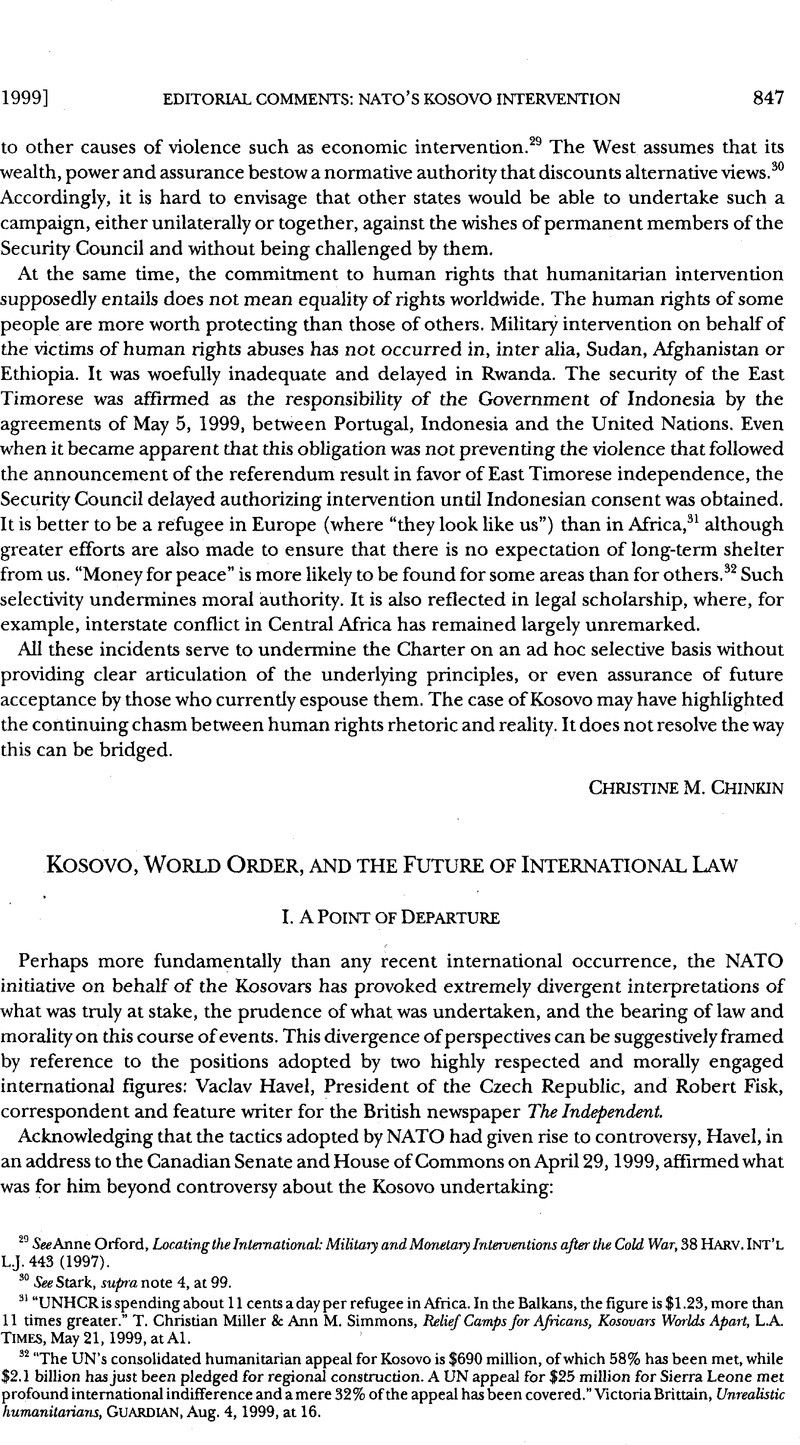Crossref Citations
This article has been cited by the following publications. This list is generated based on data provided by
Crossref.
Popovski, Vesselin
2000.
From Our Readers.
Security Dialogue,
Vol. 31,
Issue. 2,
p.
249.
Chandler, David
2001.
The people‐centred approach to peace operations: The new un agenda.
International Peacekeeping,
Vol. 8,
Issue. 1,
p.
1.
Scott, Craig
2002.
Interpreting Intervention.
Canadian Yearbook of international Law/Annuaire canadien de droit international,
Vol. 39,
Issue. ,
p.
333.
Lawler, Peter
2002.
The ‘Good War’ after September 11.
Government and Opposition,
Vol. 37,
Issue. 2,
p.
151.
Popovski, Vesselin
2002.
The UN Security Council approach to the conflicts in former Yugoslavia.
Southeast European and Black Sea Studies,
Vol. 2,
Issue. 3,
p.
39.
Morton, Jeffrey S.
and
Singh, Neil Vijay
2003.
The international legal regime on genocide.
Journal of Genocide Research,
Vol. 5,
Issue. 1,
p.
47.
Chandler, David
2003.
Rhetoric without Responsibility: The Attraction of ‘Ethical’ Foreign Policy.
The British Journal of Politics and International Relations,
Vol. 5,
Issue. 3,
p.
295.
Carmody, Chi
2003.
A Look Back at Looking Forward: Ronald St. John Macdonald and the Future of International Law.
Canadian Yearbook of international Law/Annuaire canadien de droit international,
Vol. 40,
Issue. ,
p.
323.
Kirchner, Stefan
2004.
Relative Normativity and the Constitutional Dimension of International Law: A Place for Values in the International Legal System?.
German Law Journal,
Vol. 5,
Issue. 1,
p.
47.
Infante Rejano, Eduardo
2005.
Looking Back Without Anger: Favourable Factors of Ethnic Kosovar Conflict Revisited.
SSRN Electronic Journal,
Shannon, Vaughn P.
2005.
Judge and executioner: the politics of responding to ethnic cleansing in the balkans.
Journal of Genocide Research,
Vol. 7,
Issue. 1,
p.
47.
Fine, Robert
2006.
Cosmopolitanism and violence: difficulties of judgment.
The British Journal of Sociology,
Vol. 57,
Issue. 1,
p.
49.
LYON, ALYNNA J.
and
DOLAN, CHRIS J.
2007.
American Humanitarian Intervention: Toward a Theory of Coevolution.
Foreign Policy Analysis,
Vol. 3,
Issue. 1,
p.
46.
Dexter, Helen
2008.
The ‘New War’ on Terror, Cosmopolitanism and the ‘Just War’ Revival.
Government and Opposition,
Vol. 43,
Issue. 1,
p.
55.
Chimni, B. S.
2009.
Fault Lines of International Legitimacy.
p.
303.
Schlichte, Klaus
2011.
When 'Facts' Become a Text: Reinterpreting War with Serbian War Veterans.
SSRN Electronic Journal,
Corten, Olivier
2012.
New Approaches to International Law.
p.
251.
Sloane, Robert D.
2012.
On the Use and Abuse of Necessity in the Law of State Responsibility.
American Journal of International Law,
Vol. 106,
Issue. 3,
p.
447.
Radeljić, Branislav
2014.
Official Discrepancies: Kosovo Independence and Western European Rhetoric.
Perspectives on European Politics and Society,
Vol. 15,
Issue. 4,
p.
431.
Farer, Tom
2014.
Can the United States Violently Punish the Assad Regime? Competing Visions (Including That of Anthony D’Amato) of the Applicable International Law.
American Journal of International Law,
Vol. 108,
Issue. 4,
p.
701.
